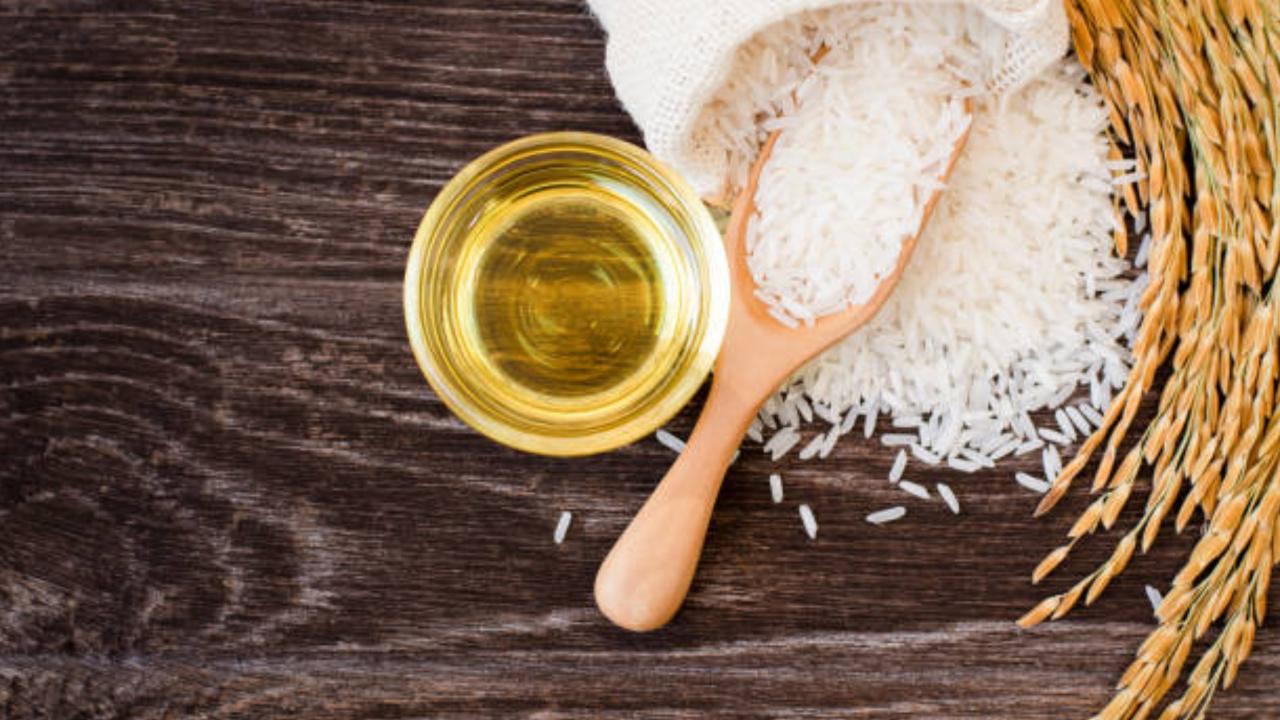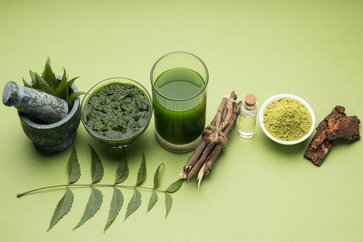Rice Bran Oil: A Superfood for a Healthier Lifestyle
Rice bran oil is a light, edible vegetable oil that is derived from the outer layer (bran) of the rice grain, as well as the germ. It is extracted using a method called pressing or solvent extraction, where the bran is processed to yield the oil. The oil has a mild, neutral flavor, making it versatile for various cooking applications without overpowering the taste of the food.
In addition to its pleasant flavor and high smoke point, rice bran oil is known for its rich nutrient profile. It contains a balanced mix of healthy fats, including monounsaturated and polyunsaturated fats, which can help reduce harmful cholesterol levels and support overall heart health.
It is also a significant source of antioxidants, such as vitamin E (tocopherols and tocotrienols), and a unique compound called oryzanol, which has been shown to possess anti-inflammatory and cholesterol-lowering properties.
Beyond its use in cooking, rice bran oil is highly valued in the skincare industry for its moisturizing and antioxidant properties, making it a popular ingredient in creams, lotions, and other beauty products.
Its health benefits, versatility in the kitchen, and ability to withstand high cooking temperatures make rice bran oil a popular choice in households around the world.
Brief History and Origin
Rice bran oil originated in Asia, where rice is a staple food. The oil is traditionally used in countries like Japan, China, and India, where rice farming has been central to their cultures for thousands of years.
In the past, rice bran oil was often considered a byproduct and discarded. However, as more research uncovered its health benefits, its commercial use began to grow, especially in the 20th century.
Today, rice bran oil is used worldwide in cooking, medicine, and cosmetics, gaining recognition for its versatility and nutrient-rich composition.
What is Rice Bran Oil?
Rice bran oil is a versatile and nutritious vegetable oil extracted from the hard outer layer of the rice grain, known as the bran. This layer is left behind after the removal of the rice husk or chaff.
With its mild flavor and high smoke point of 232°C (450°F), rice bran oil is an excellent choice for various cooking methods, including stir-frying, deep-frying, and grilling.
Its ability to remain stable at high temperatures ensures that it retains its nutritional value even during intense cooking processes.
Key Features of Rice Bran Oil
1. Nutritional Composition: Rice bran oil is celebrated for its balanced composition of healthy fats. It contains approximately:
- 37% polyunsaturated fats (PUFA)
- 45% monounsaturated fats (MUFA)
This near 1:1 ratio of PUFA to MUFA makes it a heart-healthy oil that can help improve cholesterol levels when incorporated into a balanced diet.
2. Rich in Antioxidants: Rice bran oil is packed with Vitamin E, a potent antioxidant that protects the body against oxidative stress and supports skin and immune health.
Additionally, it contains oryzanol, a unique compound known for its cholesterol-lowering properties and ability to promote heart health.
3. Affordability and Accessibility: Compared to many other cooking oils, rice bran oil is relatively affordable, especially in countries like India, where it is produced in large quantities.
Its cost-effectiveness, combined with its health benefits, has contributed to its widespread popularity.
Nutritional Profile and Composition of Rice Bran Oil
1. Fatty Acids (Omega-3, Omega-6, Omega-9): Rice bran oil has a well-balanced composition of fatty acids, which include:
- Omega-9 (Monounsaturated Fatty Acids): The oil is particularly rich in oleic acid, an omega-9 fatty acid that is known to promote heart health by helping to reduce bad cholesterol (LDL) and increase good cholesterol (HDL).
- Omega-6 (Polyunsaturated Fatty Acids): Rice bran oil contains linoleic acid, an essential fatty acid that is crucial for maintaining healthy cell structure and functions.
- Omega-3: While rice bran oil contains smaller amounts of omega-3 fatty acids, the presence of this essential fat supports overall cardiovascular health, as omega-3s are known to reduce inflammation and promote brain function.
This balance of fatty acids makes rice bran oil a heart-healthy option, supporting cardiovascular health when consumed in moderation.
2. Phytosterols: Rice bran oil contains phytosterols, plant compounds that are structurally similar to cholesterol. These compounds can help reduce the absorption of cholesterol in the digestive system, which may aid in lowering total cholesterol levels.
Phytosterols have been linked to various health benefits, including reducing the risk of heart disease and supporting healthy blood lipid levels.
3. Vitamin E (Tocopherols and Tocotrienols): Rice bran oil is a rich source of vitamin E, which includes two main forms: tocopherols and tocotrienols.
- Tocopherols are antioxidants that help protect cells from oxidative damage, promoting overall health.
- Tocotrienols, less commonly found in other vegetable oils, possess unique antioxidant properties that can help protect against chronic diseases like heart disease and certain types of cancer. Tocotrienols also have anti-inflammatory effects, which can benefit overall health and well-being.
4. Antioxidants (Oryzanol): One of the key distinguishing features of rice bran oil is oryzanol, a unique blend of plant sterols and ferulic acid. Oryzanol is known for its potent antioxidant properties, which help combat oxidative stress and protect cells from free radical damage.
It has been shown to support healthy cholesterol levels and reduce the risk of cardiovascular diseases. Additionally, oryzanol has anti-inflammatory and neuroprotective effects, making it beneficial for both heart health and cognitive function.
Top 10 Health Benefits Rice Bran Oil
Rice bran oil is rich in vitamin E, omega-3 fatty acids, and oryzanol, which all contribute to overall health. It supports heart health, reduces oxidative stress, improves cholesterol levels, and can help manage blood sugar.
Its antioxidant properties help fight free radicals, reduce inflammation, and promote a healthier immune system. It’s a great addition to a balanced diet for promoting general well-being.
1. Rice Bran Oil for Cholesterol
Rice bran oil is particularly known for its ability to help lower cholesterol levels. The presence of oryzanol (a compound found in rice bran) has been shown to reduce cholesterol absorption in the body.
Additionally, the oil’s high content of monounsaturated fats (omega-9) and polyunsaturated fats (omega-6) supports a healthy lipid profile by raising good cholesterol (HDL) while lowering bad cholesterol (LDL). This makes it a great addition to a heart-healthy diet.
2. Rice Bran Oil for Skin
Rich in vitamin E, antioxidants, and fatty acids, rice bran oil is excellent for moisturizing and nourishing the skin. It can help prevent dryness, soothe irritated skin, and reduce the appearance of fine lines and wrinkles due to its anti-aging properties.
Its gentle and non-comedogenic nature also makes it suitable for sensitive skin, helping to keep the skin smooth and healthy. Rice bran oil is a popular ingredient in anti-aging creams and moisturizers.
3. Rice Bran Oil for Hair
Rice bran oil is a nourishing oil for hair, offering a combination of vitamin E, fatty acids, and antioxidants that help strengthen hair follicles and improve scalp health. It can help reduce dandruff, moisturize dry hair, and prevent hair breakage.
Regular application of rice bran oil may lead to shinier, softer hair and promote overall hair growth by improving blood circulation to the scalp.
4. Rice Bran Oil for Heart
One of the key health benefits of rice bran oil is its positive effect on the heart. The oil has a healthy balance of monounsaturated fats (45%) and polyunsaturated fats (37%), which can help reduce bad cholesterol (LDL) levels while increasing good cholesterol (HDL).
This can contribute to lowering the risk of cardiovascular diseases. Additionally, its rich content of oryzanol can help reduce cholesterol absorption, benefiting heart health.
5. Rice Bran Oil for Immune Function
Rice bran oil contains several components, including antioxidants and phytosterols, that help strengthen the immune system.
By reducing oxidative stress and inflammation, rice bran oil supports the body’s ability to fight off infections and maintain overall immune health, reducing the risk of illness.
6. Rice Bran Oil for Digestion
Rice bran oil is beneficial for digestive health due to its high fiber content. Fiber helps regulate bowel movements, prevent constipation, and support a healthy gut microbiome.
Additionally, rice bran oil’s anti-inflammatory properties may soothe the digestive tract and improve symptoms of conditions like irritable bowel syndrome (IBS) or gastritis.
7. Rice Bran Oil for Blood Sugar Regulation
Some studies suggest that rice bran oil may help regulate blood sugar levels and improve insulin sensitivity. The oil’s ability to reduce inflammation and oxidative stress is thought to play a role in supporting metabolic health, which is particularly important for those managing or at risk of type 2 diabetes.
9. Rice Bran Oil for Weight Loss
Rice bran oil can aid in weight loss when used in moderation, thanks to its balance of healthy fats. The monounsaturated fats in rice bran oil may promote satiety, helping you feel fuller for longer and reducing overall calorie intake.
Additionally, its antioxidant properties can improve metabolism, potentially aiding in the breakdown of fats. Substituting other oils with rice bran oil in your diet may support weight management goals.
10. Rice Bran Oil for Fatty Liver
Rice bran oil can be beneficial for individuals with fatty liver disease due to its anti-inflammatory and antioxidant properties. The oil’s oryzanol content helps reduce the buildup of fat in the liver, and its high levels of unsaturated fats support better liver function.
Studies have suggested that consuming rice bran oil in place of oils high in saturated fats may help reduce liver fat accumulation and support overall liver health.
Other Uses of Rice Bran Oil
1. Rice Bran Oil for Deep Frying: Rice bran oil’s high smoke point makes it perfect for deep frying, where oils are exposed to high heat. It remains stable at high temperatures and doesn’t break down into harmful compounds as easily as other oils with lower smoke points.
The mild flavor also ensures that deep-fried foods retain their original taste without being overpowered by the oil. It’s often used in the food industry for frying snacks, chips, and other crispy foods.
2. Rice Bran Oil for Frying: As a frying oil, rice bran oil excels due to its ability to withstand high heat without smoking or releasing harmful substances. It can be used for various frying methods, including shallow frying and pan-frying.
The oil’s mild flavor ensures that it doesn’t alter the taste of the food, making it suitable for a wide variety of dishes. Its balanced fat composition makes it a heart-healthy choice for frying compared to oils with higher saturated fat content.
Rice Bran Oil Disadvantages
Rice bran oil is widely regarded as a healthy and versatile cooking oil, but like any other food product, it may have potential side effects and risks for certain individuals.
While it is generally safe for most people, understanding its possible adverse effects and precautions is essential to ensure safe consumption and use.
Common Side Effects of Rice Bran Oil
1. Digestive Issues: Increasing the amount of rice bran or rice bran oil in your diet can lead to:
- Unpredictable bowel movements
- Intestinal gas
- Stomach discomfort
These symptoms are most common during the initial weeks of incorporating rice bran into your diet as your digestive system adjusts to the increased fiber intake.
2. Skin Irritation: When used topically, such as in baths, rice bran oil is generally safe but may cause:
- Itching
- Skin redness
In rare cases, rice bran infested with a pest called the straw itch mite has been reported to cause rashes and itching. However, such instances are uncommon.
Precautions and Warnings
1. Pregnancy and Breastfeeding
- Rice bran oil is considered safe in amounts typically found in food.
- However, there is insufficient evidence to confirm its safety in larger medicinal doses during pregnancy or breastfeeding. Pregnant and breastfeeding women should consult their healthcare provider before using rice bran oil for therapeutic purposes.
2. Gastrointestinal (GI) Conditions
Individuals with digestive tract problems should avoid rice bran oil. These conditions include:
- Intestinal ulcers
- Adhesions
- Narrowing or blockage of the digestive tract
- Slow digestion
- Other stomach or intestinal disorders
The high fiber content in rice bran can exacerbate these conditions and potentially block the digestive tract.
3. Swallowing Difficulties
- People with trouble swallowing should use rice bran oil with caution.
- The fiber in rice bran may pose a choking hazard, especially if consumed in large quantities or without adequate liquid.
4. Allergic Reactions
While rice bran oil is not a common allergen, some individuals may experience allergic reactions, particularly if the rice bran is contaminated or infested with pests like the straw itch mite. Symptoms of an allergic reaction may include:
- Rash
- Itching
- Skin redness
If you experience any of these symptoms, discontinue use and consult a healthcare professional.
FAQs
Q1: Is rice bran oil healthy?
A1: Yes, rice bran oil is healthy due to its high content of monounsaturated and polyunsaturated fats, as well as antioxidants like vitamin E and oryzanol, which support heart and overall health.
Q2: What is the disadvantage of rice bran oil?
A2: Its high omega-6 fatty acid content can promote inflammation if not balanced with omega-3s. Additionally, it is often highly refined, which can strip away beneficial nutrients.
Q3: Is rice bran oil better for you than olive oil?
A3: Both oils are healthy; however, rice bran oil is better for high-heat cooking due to its higher smoke point, while olive oil offers more antioxidants and heart-healthy benefits.
Q4: Is rice bran oil better than sunflower oil?
A4: Rice bran oil has a better balance of monounsaturated fats and is higher in oryzanol, making it more heart-healthy, whereas sunflower oil is rich in vitamin E but may not provide the same heart benefits.
Q5: Is rice bran oil good or bad?
A5: Rice bran oil is generally good for health, offering heart benefits and antioxidant properties, but it should be used in moderation due to its omega-6 content.
Q6: Which oil is best for health?
A6: Healthy oils include olive oil for its antioxidants, avocado oil for monounsaturated fats, and rice bran oil for its balanced fat profile and high smoke point.
Q7: Is rice bran oil real or fake?
A7: Rice bran oil is real, extracted from the bran of rice. Ensure authenticity by checking for purity and non-GMO certification.
Q8: Which oil is better, rice bran or groundnut (peanut) oil?
A8: Rice bran oil is better for high-heat cooking due to its higher smoke point, while groundnut oil is also healthy but not as ideal for high-heat applications.
Q9: Which rice bran oil is best?
A9: The best rice bran oil is cold-pressed or extra virgin, as it ensures minimal processing, and it’s recommended to choose non-GMO and organic options.
Q10: What is the difference between normal oil and rice bran oil?
A10: Rice bran oil has a better balance of healthy fats and unique antioxidants like oryzanol, offering more heart health benefits than regular oils.
Q11: Which oil is best for cooking in India?
A11: Rice bran oil is a popular choice in India for its high smoke point and health benefits. Mustard oil and groundnut oil are also widely used in Indian kitchens.
Q12: Is rice bran oil good for fatty liver?
A12: Yes, rice bran oil may help reduce fatty liver symptoms due to its antioxidant and anti-inflammatory properties, especially from oryzanol and vitamin E.
Rice bran oil is a highly versatile and health-boosting oil that offers numerous benefits. From its heart-healthy properties and high smoke point to its positive effects on skin and hair, rice bran oil proves to be an excellent addition to your diet and beauty routine.
Resources:
- Rice Bran Oil: Emerging Trends in Extraction, Health Benefit, and Its Industrial Application(1)
- Nutrition and applications of rice bran oil: a mini-overview(2)
- Rice bran oil, the Future Edible Oil of India: A mini Review(3)
- Biological Functions and Activities of Rice Bran as a Functional Ingredient: A Review(4)


























